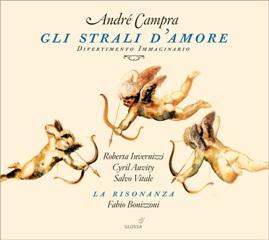Campra - Gli strali d’Amore (2011)
Campra - Gli strali d’Amore (2011)

Louis-Nicolas Clérambault (1676-1749) 01 Sonata II in G major, La Félicité (C.52), for two violins and basso continuo: Lentement - Allegro André Campra (1660-1744) 02 Recitativo (Lelio): Ah, che d’amor la gioia 03 a 2 (Lelio, Il Dottore): D’un geloso core - Recitativo (Il Dottore): D’amorosi mirti 04 Aria (Lelio): Amanti godete 05 Recitativo (Leonora): Alle vaghe lusinghe 06 Aria (Leonora): All’incanto d’un bel riso 07 Recitativo (Lelio): Adorata Leonora Louis-Nicolas Clérambault 08 Sonata II in G major, La Félicité (C.52): Allegro - [Gavotte] - [Gigue] - Lent André Campra 09 Recitativo (Leonora): Come, come dar fede 10 Aria (Leonora): La farfalla intorno ai fiori 11 Recitativo (Lelio): Idolo mio, t’arresta 12 Aria (Leonora): Pargoletti faretrati 13 Recitativo (Lelio): Idolo mio, già l’alma 14 a 2 (Lelio, Il Dottore): Vezzosette care pupillete 15 Recitativo (Leonora): Non rispondere, Amore 16 Aria (Leonora): Vuo’ vendetta 17 Recitativo (Leonora): Ma, Leonora, che pensi? 18 Aria (Leonora): Lungi da me martiri 19 Recitativo (Leonora): Ma ecco, che la quiete 20 a 2 (Il Dottore, Lelio): Luci belle 21 Recitativo (Leonora): Ecco che già il riposo 22 Aria (Leonora): Amor diletto 23 Recitativo (Il Dottore): La mia amata Leonora 24 a 2 (Il Dottore, Leonora): Bell’idolo d’amore 25 Recitativo (Leonora): Molesto mi è Il Dottore 26 Aria (Leonora): Amor te’l giuro affé Louis-Nicolas Clérambault 27 Sonata V in D major, Chaconne (C.55), for violin and basso continuo André Campra 28 Recitativo (Leonora): L’unico ben 29 Aria (Leonora): Non si puo’ vede 30 Aria (Leonora): Si scherzi si rida 31 Recitativo (Lelio): Se l’amata Leonora 32 Aria (Leonora): Ch’io viva senza te 33 Contre-danse 34 a 3 (Leonora, Il Dottore, Lelio): Tutti lieti festeggiate Roberta Invernizzi, dessus [Leonora] Cyril Auvity, haute-contre [Lelio] Salvo Vitale, basse [Il Dottore] La Risonanza Ana Liz Ojeda - violin Claudia Combs - violin Caterina Dell’Agnello - basse de violon Gabriele Palomba - theorbo Fabio Bonizzoni - harpsichord & direction
Fabio Bonizzoni has come up with another imaginative and enticing programme for his latest Glossa release, creating an Italian “pastiche” drama with music by André Campra and with the starring presence of soprano Roberta Invernizzi. This is the next new hit from La Risonanza to follow on discs devoted to music by Handel, Lully and Alessandro Scarlatti.
André Campra, a major figure in the world of French opera between Lully and Rameau, was clearly not very impressed by the former’s discouragement of Italian musical practices inside France when he was elevated to the post of surintendant de la musique du roi. In many of Campra’s French opéras-ballets and comédies-lyriques written by him as the 18th century was emerging out of the 17th (the period of the summit and the waning of the reign of Louis XIV) are to be found interpolated many dashing arias with texts in Italian (Campra’s father was Italian-born like Lully padre e figlio) and from some of these Fabio Bonizzoni and Angela Romagnoli have chosen and concocted Gli strali d’Amore (Love’s Arrows), thereby, curiously, following in the footsteps of Campra himself – who was a dab hand at this activity himself, as demonstrated by his own Les Fragments de Mr. De Lully.
Joining Bonizzoni and Invernizzi (Glossa has recently issued a “Portrait” album involving the Milanese soprano) in this delightful sequence of recitatives and da capo arias recorded in Tuscan Brunello are the impressive Cyril Auvity and Salvo Vitale, and a sprightly La Risonanza, together with an informative booklet essay from Barbara Nestola. ---glossamusic.com
The "divertimento immaginario" offered here is just that: a group of Italian arias by André Campra, from around the turn of the 17th to the 18th century, assembled into a lighthearted tale of a little love triangle by the Italian historical-performance group La Risonanza and its leader-keyboardist, Fabio Bonizzoni. The names are redone, recitatives are added with text by Angela Romagnoli and idiomatic music by Bonizzoni himself, and the whole is interspersed with sonatas by Louis-Nicolas Clérambault. Annotator Barbara Nestola claims that Campra would have approved, and there is no reason to doubt her; appreciation of Italian opera in France did not begin with François Couperin but existed on the margins of official French style for several decades prior to that. Campra's arias were incorporated into French tragédies lyriques, circulated singly among enthusiasts, and generally written to fill a need even if the purity of the French style was officially maintained. So while there isn't direct evidence of pastiches like this, the idea would probably not have been without sense at the time. The program as a whole represents a sort of fusion of Italian and French style. It may be of most interest to avid followers of Baroque opera; the story of the divertimento as such does not hold together with much specificity. But the singing of soprano Roberta Invernizzi is as freely gorgeous as ever, and there are a few lovely arias. Sample the hypnotic sleep duet, track 20, to hear the nearly as-good male singers. The small string group and the theorbo-and-harpsichord continuo of La Risonanza creates a relaxed sound that passes for the 17th-century equivalent of a mellow romantic mood. Recommended, especially for fans of the divine Invernizzi. ---James Manheim, AllMusic Review
download (mp3 @320 kbs):
yandex mediafire ulozto gett bayfiles








